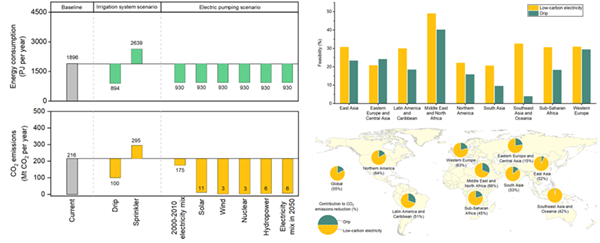Study Reveals Global Energy Use and Carbon Emissions from Irrigated Agriculture
2024-04-18
Irrigation, a promising climate change adaptation strategy, relies on fossil fuel-based energy for pumping, resulting in the emission of greenhouse gases. With the increasing demand for irrigation water and the depletion of fossil fuels, irrigated agriculture faces severe challenges for sustainable development.
A recent study, published in Nature Communications, and led by CHEN Yaning's group from the Xinjiang Institute of Ecology and Geography of the Chinese Academy of Sciences, assessed the global energy consumption and carbon emissions associated with irrigation, while measuring the potential energy and carbon reductions achievable through the adoption of efficient and low-carbon irrigation practices.
To reveal water-energy-carbon nexus in irrigated agriculture, researchers developed a global irrigation energy consumption and carbon emission assessment model using a physics-based method. The method was based on the fundamental physical relationship between water withdrawal and energy consumption, taking into account the impact of pumping and irrigation systems on energy usage. The model comprised water extraction and transportation modules, capable of simultaneously outputting multiple variables at grid scale, such as energy consumption and carbon emissions.
Using this model, researchers quantified global energy consumption and CO2 emissions from irrigation. They found that irrigation contributes 216 million metric tons of CO2 emissions and consumes 1896 petajoules of energy annually, representing 15% of greenhouse gas emissions and energy utilized, or 30% of energy input and carbon emissions per unit area in agricultural operations. They also found that groundwater pumping accounts for 89% of the total energy consumption in irrigation.
"With future expansion of irrigation, additional energy consumption for irrigation will add pressure on energy supply in African and European countries,” said Prof. DUAN Weili, the corresponding author of this study.
To achieve the sustainable development of irrigated agriculture, researchers evaluated the efficacy of various mitigation interventions, including the adoption of water-efficient irrigation systems, electric pumping systems, and renewable energy sources. They found that a combination of drip irrigation and low-carbon irrigation methods has the potential to cut energy consumption and energy-related CO2 emissions in half.
This study sheds light on the previously uncharted territory of global energy consumption and carbon emissions associated with irrigation.
Article link: https://doi.org/10.1038/s41467-024-47383-5

Fig.1. Mitigation potentials of energy use and CO2 emissions under different scenarios (Left) and Feasibility of solutions to reduce CO2 emissions of irrigation on a country-level scale (Right).
Contact
LONG Huaping
Xinjiang Institute of Ecology and Geography
E-mail: longhp@ms.xjb.ac.cn



